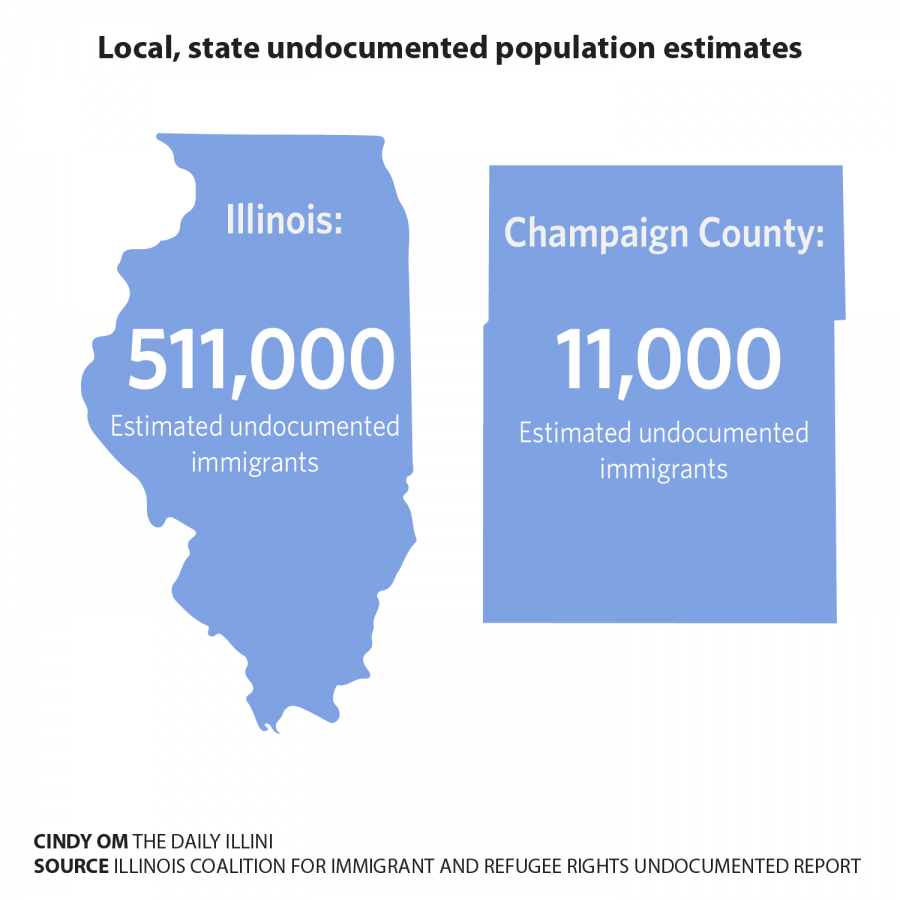Understanding Champaign’s response to undocumented immigration
April 24, 2017
During the CGTV Champaign Connection interview with community members, Champaign Police Chief Anthony Cobb stated to the public that his department is not directly involved with the enforcement of immigration law unless it is obligated by a court order. “(Cobb’s statements were) really about educating the community on what the local police department’s role is versus what Immigration and Customs Enforcement’s role is,” said LaEisha Meaderds, assistant to the chief for community services at the Champaign Police Department.
Champaign County Sheriff Dan Walsh said in a September 2016 article with illinoishomepage.net that this non-involvement is not so much a political issue, as the sanctuary debate would suggest, but a matter of legality. Citing case law from the county’s judicial circuit, Walsh said in the interview that detainers issued by Immigration and Customs Enforcement do not qualify as court orders, and carrying out those detainers potentially violates the detainee’s Fourth Amendment rights.
“In the event of a court order or arrest warrant (for an undocumented immigrant), local law enforcement is obligated, as they are with any arrest warrant, to make an arrest,” said Jeff Hamilton, City of Champaign communications manager.
But Hamilton said that beyond those legal obligations, the city is typically not involved with Immigration and Customs Enforcement tasks. The urge to distinguish local law enforcement from Immigration and Customs Enforcement can be traced back several years, when the Secure Communities program was established in 2009. The program, which allowed Immigration and Customs Enforcement to utilize local law enforcement to carry out immigration tasks, was met with resistance. Some cities refused to comply, not just on legal concerns, but as a matter of effective policing. “The push back from law enforcement is that to do their work, which is protecting communities, they really need the collaboration and cooperation of citizens,” said Mike Doyle, University YMCA director. “When you tie your local police to the threat of taking people away, then people don’t want to cooperate with police, and that undermines (the police’s) trust in the community.” A new bill introduced to the Illinois House in February, called the Illinois Trust Act, would officially prohibit detaining an individual “solely on the basis of any immigration detainer or administrative warrant … after that individual becomes eligible for release from custody.” The bill is currently under review.
Urbana reaffirmed its title as a “sanctuary city” in a resolution released in December 2016, vowing to “defend the human rights of immigrants” and “reject any effort to create religious litmus tests or registries of individuals based on religion or ethnicity.”
Get The Daily Illini in your inbox!
“I think what the value around the sanctuary debate is (to communicate) the overall concept of what we’re looking for in our community,” Doyle said. “That’s the sense of safety, the sense of belonging and participating in a community without the fear or threat of being taken away.” Doyle said while the sanctuary title has varying definitions, the message it sends is clear. With President Trump calling to reinstate the Secure Communities program, cities like Urbana have voiced their opposition with an official designation.
The University student body circulated petitions in December to declare the University as a sanctuary campus. In response, University president Tim Killeen said in a Massmail that the University system would not declare its campuses as sanctuaries because “the concept is not well specified and may actually jeopardize our institution.”
But even without an official designation, Killeen emphasized the University’s commitment to “do everything (it) can within the law to reassure, support and protect our students.”
Editor’s note: A previous version of this article incorrectly stated Champaign had put in place policies to protect undocumented immigrants. Champaign does not have policies to protect undocumented immigrants; however, local law enforcement officers are not seeking out resident’s citizenship or status. Likewise, a previous version of this article incorrectly stated that Police Chief Cobb’s comments followed immigration and custom enforcement raids. A previous headline incorrectly stated, “Champaign set to resist ICE raids.” They are not set to resist ICE raids. The Daily Illini regrets the errors.







